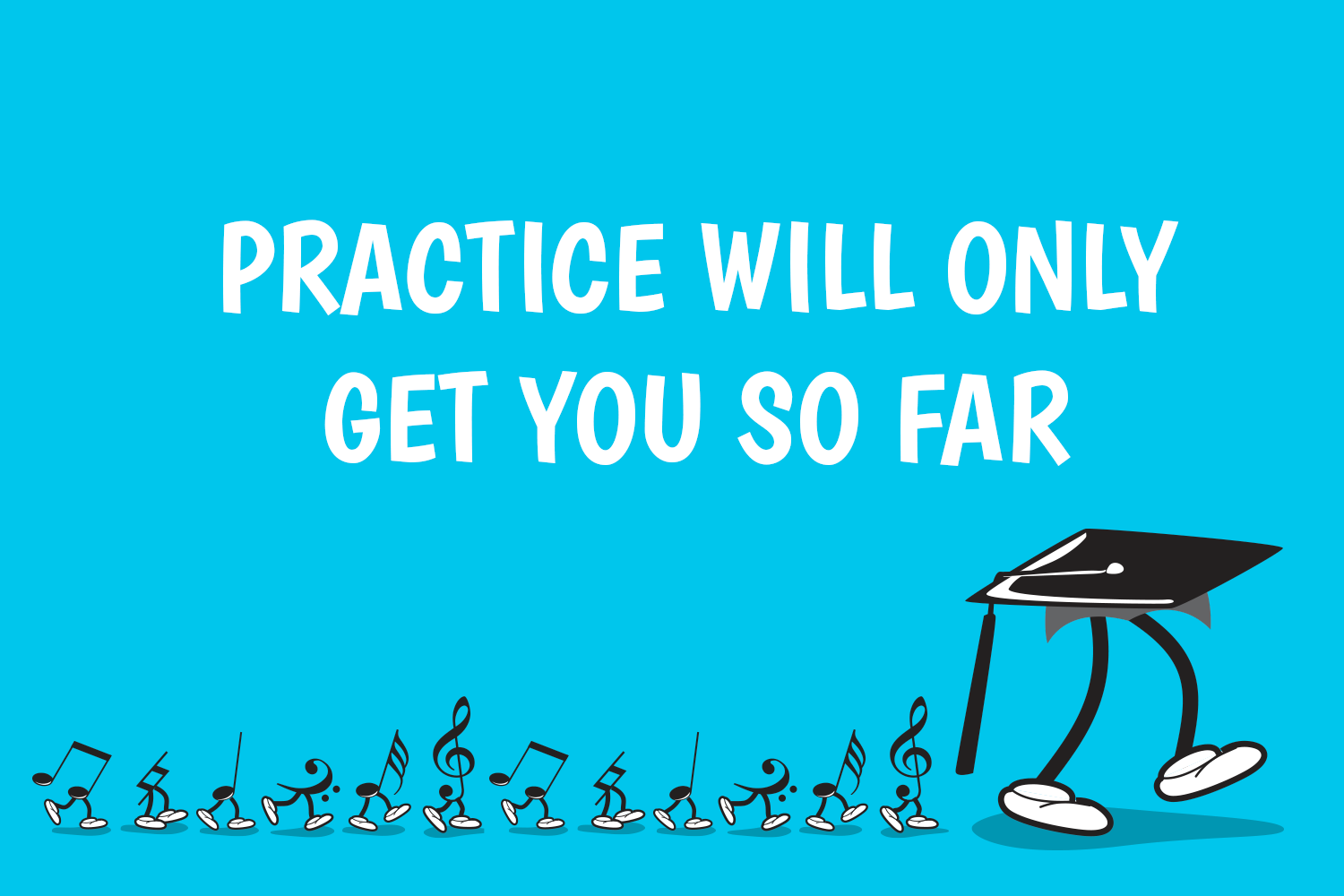Practice will only get you so far

This post originally appeared on our PreachWhatYouPractice site.
Original Published Date: 13 October 2013
The recital I did with my violinist friend was exactly one month ago. It went pretty well. He was not at all happy with his playing, even though it was superb… he’s that level of musician. I was only reasonably happy with my playing, and it was indeed reasonable playing, although the 80+ audience thought it was wonderful. However, I made some frustrating mistakes. I’ll come back to those a bit later.
I have not practised at all since then, which is a shame. I was in a nice habit of doing 1-2 hours each day, going through lots of technical work as well as the repertoire for the recital. And then, as soon as it was over and I thought ‘I’ll just have a couple of days off’, the practice routine faded into nothingness. True, it was school holidays and we went camping and then I spent a ridiculous amount of time organising a Hunger Games birthday party for my daughter… but essentially, just like exercising, it’s amazing how quickly you can get out of a practice habit and then somehow there’s just no time in the day anymore.
Lately, I have been a feeling a mixture of guilt about not practising and curiosity as to what might have become of my playing, so I decided to do an experiment. I tried playing through the Franck accompaniment, up to speed. I had theorised that since I had not played piano at all during the past month (see lame excuses above), and this piece was only newly in my fingers (I had practised it for 3 months, from June to September), that I would not be able to play it at speed, if at all.
But, surprisingly, I could. My muscle memory took over in a lot of places. There was no way I was actually reading the music in front of me, it was still there in my fingers. It was extremely rough and had lots of mistakes, but I estimated that it would only take a couple of hours of intense work to polish it up.
It seems that either my practice was very effective which was why I could still play it, or muscle memory lasts longer than one month (or, if we use ratios, muscle memory lasts longer than 33% of the time you spent learning/playing the piece). Of course, I can only speak for my own practice and my own muscle memory here; if I had the time or inclination I would do a PhD on it 1.
So, if my practice was good and I could still play the piece 1 month later without too many problems, WHY DID I MAKE MISTAKES DURING THE RECITAL???
The mistakes were incredibly frustrating. Some of them were very tiny, some were a little more significant but nothing anyone but the most seasoned listener would notice, one of them was a whopper that I’m sure even the dementia patients in the audience would have picked up. However, NONE of the above was anything that had ever happened to me during practice.
The whopper mistake was surreal. It happened during my first solo passage in the first movement. Suddenly, with the music right there in front of me, I didn’t know where I was. I’d practiced that passage hundreds of times and somehow this bar, which wasn’t even a particularly difficult bar, disappeared and I couldn’t play it. It was only a fraction of a second before I recovered, so it wasn’t a total breakdown or anything, but this was enough to disrupt the flow and for it to be fairly obvious.
I can remember the moments just before the mistake. I was actually thinking things that I don’t normally think in practice, like ‘OMG this is it this is my solo now I really have to get this right NOW” and I started to question my fingers where I never have before. This, I am sure, was my undoing. My fingers knew what to do under normal practice conditions when I was concentrating, but I had totally changed the conditions by losing focus.
I used to be able to perform so easily when I was younger, but perhaps with [a fair bit of] age comes a degree of self-consciousness, and a fear of ‘getting it wrong’ that can destroy focus at the most inopportune time. Mental preparation is just as important as physical practice, and I am sure that this is where I was lacking.
A lot is made of the mental preparation required by athletes and professional sports players. Training is important but won’t get you all the way; the rest is all about focus and determination. There is a fabulous blog called The Bulletproof Musician, which draws analogies between the plight of elite musicians and elite athletes, and even extends to other high-pressure occupations such as surgery, where humans have to perform and only get one chance to get it right.
I certainly like the idea of being bulletproof, so I think I’m going to spend more time on this site. I’d love to be able to ensure that comments like ‘oh I hope I play this well’ don’t pop into my head at the exact moment I’m trying to play it well. But what it really comes down to is that if I’m going to bother practicing the piano, I also need to practice focusing, so I can be confident that in performance all the hours spent on the piano will actually pay off.

I also scramble parts when accompanying that I never scramble when practising. And yes, I agree, FOCUS!
Accompanying an HSC student I found the piano provided was TALLER than mine. I could see my reflection.
“Oh! Look at my glasses! Hmmm, I’ve never seen myself in a regular place wearing these glasses… er, what’s the next note?”
The next time I accompanied her there was a snare drum rattling behind us… and the reflection!
When we finally performed for the HSC examiners I had a black shawl to cover the piano, and I checked the snare.
When accompanying, we CAN’T focus on our own playing – we MUST focus on the other performer. Makes it tricky.
Wonderful insights Sushila! 🙂